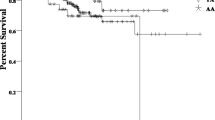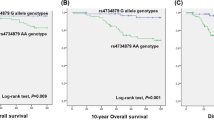Abstract
This study aimed to investigate the correlation between INSR gene polymorphisms on platinum-based chemotherapy sensitivity and prognosis in epithelial ovarian cancer (EOC). A total of 339 EOC patients receiving postoperative chemotherapy were recruited for the study. Tag single-nucleotide polymorphism of INSR gene was screened from HapMap combined with available literature. Frequency distribution of genotypes and alleles in INSR gene was sequenced by ABI3100-Avant. Compared with CC+GC genotype, INSR rs2252673 GG genotype and rs3745546 CC genotype showed less platinum-based chemotherapy sensitivity in EOC patients (odds ratio (OR)=0.269, 95% confidence interval (CI)=0.159~0.456; OR=0.445, 95% CI=0.214~0.926, respectively), as well as serous EOC patients (OR=0.083, 95% CI=0.024~0.278; OR=0.235, 95%CI=0.053~1.041, respectively). The clinical characteristics including age, clinical stage, histological grade and residual lesion size were significantly related with chemosensitivity to platinum drugs and mortality in EOC patients. According to Kaplan–Meier curve, compared with CC+GC genotype, rs2252673 GG genotype showed significantly decreased survival rate in EOC patients (P<0.05). Cox regression model indicated that rs2252673, age and clinical stage were independent risk factors for the prognosis in EOC (all P<0.05). These findings indicate that INSR rs2252673 and rs3745546 polymorphisms were associated with sensitivity to platinum-based chemotherapy in EOC patients and rs2252673 polymorphism may be an independent risk factor for EOC prognosis.
This is a preview of subscription content, access via your institution
Access options
Subscribe to this journal
Receive 12 print issues and online access
$259.00 per year
only $21.58 per issue
Buy this article
- Purchase on Springer Link
- Instant access to full article PDF
Prices may be subject to local taxes which are calculated during checkout


Similar content being viewed by others
References
Sakalar C, Mazumder S, Johnson JM, Altuntas CZ, Jaini R, Aguilar R et al. Regulation of murine ovarian epithelial carcinoma by vaccination against the cytoplasmic domain of anti-Mullerian hormone receptor II. J Immunol Res 2015; 2015: 630287.
Sestito R, Cianfrocca R, Rosano L, Tocci P, Semprucci E, Di Castro V et al. miR-30a inhibits endothelin A receptor and chemoresistance in ovarian carcinoma. Oncotarget 2015; 7: 4009–4023.
Siegel R, Ma J, Zou Z, Jemal A . Cancer statistics, 2014. CA Cancer J Clin 2014; 64: 9–29.
Moore RG, Jabre-Raughley M, Brown AK, Robison KM, Miller MC, Allard WJ et al. Comparison of a novel multiple marker assay vs the Risk of Malignancy Index for the prediction of epithelial ovarian cancer in patients with a pelvic mass. Am J Obstet Gynecol 2010; 203: e221–e226.
Ludwig AH, Murawska M, Panek G, Timorek A, Kupryjanczyk J . Androgen, progesterone, and FSH receptor polymorphisms in ovarian cancer risk and outcome. Endocr Relat Cancer 2009; 16: 1005–1016.
Tecza K, Pamula-Pilat J, Kolosza Z, Radlak N, Grzybowska E . Genetic polymorphisms and gene-dosage effect in ovarian cancer risk and response to paclitaxel/cisplatin chemotherapy. J Exp Clin Cancer Res 2015; 34: 2.
Cook LS, Leung AC, Swenerton K, Gallagher RP, Magliocco A, Steed H et al. Adult lifetime alcohol consumption and invasive epithelial ovarian cancer risk in a population-based case-control study. Gynecol Oncol 2016; 140: 277–284.
Rauh-Hain JA, Foley OW, Winograd D, Andrade C, Clark RM, Vargas RJ et al. Clinical characteristics and outcomes of patients with stage I epithelial ovarian cancer compared with fallopian tube cancer. Am J Obstet Gynecol 2015; 212: e601–e608.
Li K, Li W . Association between polymorphisms of XRCC1 and ADPRT genes and ovarian cancer survival with platinum-based chemotherapy in Chinese population. Mol Cell Biochem 2013; 372: 27–33.
Mukherjee S, Shaikh N, Khavale S, Shinde G, Meherji P, Shah N et al. Genetic variation in exon 17 of INSR is associated with insulin resistance and hyperandrogenemia among lean Indian women with polycystic ovary syndrome. Eur J Endocrinol 2009; 160: 855–862.
Lee EJ, Oh B, Lee JY, Kimm K, Lee SH, Baek KH . A novel single nucleotide polymorphism of INSR gene for polycystic ovary syndrome. Fertil Steril 2008; 89: 1213–1220.
Goodarzi MO, Louwers YV, Taylor KD, Jones MR, Cui J, Kwon S et al. Replication of association of a novel insulin receptor gene polymorphism with polycystic ovary syndrome. Fertil Steril 2011; 95: 1736–1741; e1–11.
Semple RK, Savage DB, Cochran EK, Gorden P, O'Rahilly S . Genetic syndromes of severe insulin resistance. Endocr Rev 2011; 32: 498–514.
Arcidiacono B, Iiritano S, Nocera A, Possidente K, Nevolo MT, Ventura V et al. Insulin resistance and cancer risk: an overview of the pathogenetic mechanisms. Exp Diabetes Res 2012; 2012: 789174.
Feng C, Lv PP, Yu TT, Jin M, Shen JM, Wang X et al. The association between polymorphism of INSR and polycystic ovary syndrome: a meta-analysis. Int J Mol Sci 2015; 16: 2403–2425.
Ofer P, Heidegger I, Eder IE, Schopf B, Neuwirt H, Geley S et al. Both IGF1R and INSR knockdown exert antitumorigenic effects in prostate cancer in vitro and in vivo. Mol Endocrinol 2015; 29: 1694–1707.
Khrunin AV, Moisseev A, Gorbunova V, Limborska S . Genetic polymorphisms and the efficacy and toxicity of cisplatin-based chemotherapy in ovarian cancer patients. Pharmacogenomics J 2010; 10: 54–61.
Scully RE . World Health Organization classification and nomenclature of ovarian cancer. Natl Cancer Inst Monogr 1975; 42: 5–7.
De Angelis V . [Activity, objective response, and WHO and RECIST (Response Evaluation Criteria In Solid Tumor) evaluation criteria]. Suppl Tumor 2004; 3: S7–S9.
Fang F, Balch C, Schilder J, Breen T, Zhang S, Shen C et al. A phase 1 and pharmacodynamic study of decitabine in combination with carboplatin in patients with recurrent, platinum-resistant, epithelial ovarian cancer. Cancer 2010; 116: 4043–4053.
Fu S, Hu W, Iyer R, Kavanagh JJ, Coleman RL, Levenback CF et al. Phase 1b-2a study to reverse platinum resistance through use of a hypomethylating agent, azacitidine, in patients with platinum-resistant or platinum-refractory epithelial ovarian cancer. Cancer 2011; 117: 1661–1669.
Elattar A, Warburton KG, Mukhopadhyay A, Freer RM, Shaheen F, Cross P et al. Androgen receptor expression is a biological marker for androgen sensitivity in high grade serous epithelial ovarian cancer. Gynecol Oncol 2012; 124: 142–147.
Unsal T, Konac E, Yesilkaya E, Yilmaz A, Bideci A, Onen HI et al. Genetic polymorphisms of FSHR, CYP17, CYP1A1, CAPN10, INSR, SERPINE1 genes in adolescent girls with polycystic ovary syndrome. J Assist Reprod Genet 2009; 26: 205–216.
Lee EJ, Yoo KJ, Kim SJ, Lee SH, Cha KY, Baek KH . Single nucleotide polymorphism in exon 17 of the insulin receptor gene is not associated with polycystic ovary syndrome in a Korean population. Fertil Steril 2006; 86: 380–384.
Chen ZJ, Zhao H, He L, Shi Y, Qin Y, Shi Y et al. Genome-wide association study identifies susceptibility loci for polycystic ovary syndrome on chromosome 2p16.3, 2p21 and 9q33.3. Nat Genet 2011; 43: 55–59.
Shi Y, Zhao H, Shi Y, Cao Y, Yang D, Li Z et al. Genome-wide association study identifies eight new risk loci for polycystic ovary syndrome. Nat Genet 2012; 44: 1020–1025.
Du J, Wang J, Sun X, Xu X, Zhang F, Wang B et al. Family-based analysis of INSR polymorphisms in Chinese PCOS. Reprod Biomed Online 2014; 29: 239–244.
Du J, Wang Z, Zhang J, Jia L, Zhang F, Shi Y et al. [Association between single nucleotide polymorphism of rs2252673 of INSR gene and polycystic ovarian syndrome]. Zhonghua Fu Chan Ke Za Zhi 2014; 49: 919–924.
Kim HS, Kim MK, Chung HH, Kim JW, Park NH, Song YS et al. Genetic polymorphisms affecting clinical outcomes in epithelial ovarian cancer patients treated with taxanes and platinum compounds: a Korean population-based study. Gynecol Oncol 2009; 113: 264–269.
Steffensen KD, Waldstrom M, Jakobsen A . The relationship of platinum resistance and ERCC1 protein expression in epithelial ovarian cancer. Int J Gynecol Cancer 2009; 19: 820–825.
Seino S, Seino M, Nishi S, Bell GI . Structure of the human insulin receptor gene and characterization of its promoter. Proc Natl Acad Sci USA 1989; 86: 114–118.
Jochumsen KM, Tan Q, Hogdall EV, Hogdall C, Kjaer SK, Blaakaer J et al. Gene expression profiles as prognostic markers in women with ovarian cancer. Int J Gynecol Cancer 2009; 19: 1205–1213.
Saini V . Molecular mechanisms of insulin resistance in type 2 diabetes mellitus. World J Diabetes 2010; 1: 68–75.
Qi BL, Li Y, Wang N, Zhou RM, Hu P, Kang S . [Polymorphisms of ERCC1 gene and outcomes in epithelial ovarian cancer patients with platinum-based chemotherapy]. Zhonghua Fu Chan Ke Za Zhi 2013; 48: 847–852.
Soonthornthum T, Suraseraneewong V, Kengsakol K, Wijaithum K, Kasemsan P, Prommatt S . Thrombocytosis in advanced epithelial ovarian cancer. J Med Assoc Thai 2007; 90: 1495–1500.
Thavaramara T, Phaloprakarn C, Tangjitgamol S, Manusirivithaya S . Role of neutrophil to lymphocyte ratio as a prognostic indicator for epithelial ovarian cancer. J Med Assoc Thai 2011; 94: 871–877.
Raungkaewmanee S, Tangjitgamol S, Manusirivithaya S, Srijaipracharoen S, Thavaramara T . Platelet to lymphocyte ratio as a prognostic factor for epithelial ovarian cancer. J Gynecol Oncol 2012; 23: 265–273.
Cho H, Hur HW, Kim SW, Kim SH, Kim JH, Kim YT et al. Pre-treatment neutrophil to lymphocyte ratio is elevated in epithelial ovarian cancer and predicts survival after treatment. Cancer Immunol Immunother 2009; 58: 15–23.
Asher V, Lee J, Innamaa A, Bali A . Preoperative platelet lymphocyte ratio as an independent prognostic marker in ovarian cancer. Clin Transl Oncol 2011; 13: 499–503.
Acknowledgements
We give our sincere appreciation to the reviewers for their helpful comments on this study. This work was supported by grants from Henan Provincial Science and Technique Program (162102310014) and Henan Provincial Medical Science and Technique Program (201602218).
Author information
Authors and Affiliations
Corresponding author
Ethics declarations
Competing interests
The authors have declared that no competing interests exist
Rights and permissions
About this article
Cite this article
Hu, JL., Hu, XL., Han, Q. et al. INSR gene polymorphisms correlate with sensitivity to platinum-based chemotherapy and prognosis in patients with epithelial ovarian cancer. Gene Ther 24, 392–398 (2017). https://doi.org/10.1038/gt.2017.26
Received:
Revised:
Accepted:
Published:
Issue Date:
DOI: https://doi.org/10.1038/gt.2017.26
This article is cited by
-
ERCC1 rs11615 polymorphism and chemosensitivity to platinum drugs in patients with ovarian cancer: a systematic review and meta-analysis
Journal of Ovarian Research (2021)



